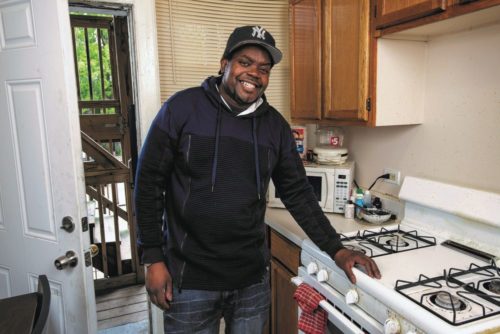The City of Chicago announced today the expansion of the Chicago and Cook County Flexible Housing Pool (FHP) with $1.78 million in new investments. UI Health has committed $350,000 to the program.
The FHP, which was established by the city in 2018, is a public-private partnership that provides a streamlined process and mechanism to provide supportive housing for homeless individuals who are frequent users of hospital emergency rooms, paramedic services, jails andshelters. The program offers a housing subsidy together with wraparound health and social services. The Center for Housing and Health leads housing administration and tenancy support services for the FHP. The program already has housed 23 individuals.
UI Health has led the way in Chicago in providing housing for homeless emergency department patients. UI Health’s Better Health Through Housing program has provided permanent housing and supportive services to 59 patients since it began in 2015. It is funded by UI Health, which has provided a total of $559,000.
“The UI Health Better Health Through Housing program was started to provide permanent housing and social services to chronically homeless emergency department patients. The Flexible Housing Pool expands this concept by consolidating capital to build capacity to house more individuals, so it provides a synergistic effect that is much greater than what individual hospitals can do on their own,” said Mike Zenn, CEO of UI Health.
“When we looked into our records, we found that close to half of our top 100 frequent emergency department patients had experienced some form of homelessness within the last 12 months,” said Stephen Brown, director of the UI Health Better Health Through Housing program. “We established our program because chronic homelessness is a major social determinant of health.”
He said patients who have no home base tend to live about 27 years fewer than someone with permanent housing. They also have higher risks for mortality, chronic conditions as well as substance abuse, HIV and mental health issues, he said. In addition, being homeless makes it much harder to manage one’s health.
“We have found that housing these individuals not only helps them to better manage their health, it is also less expensive to hospitals and Medicaid,” he said.
Brown said that just one hospital admission is about five times more expensive than 30 days of supportive housing.
Among participants in the Better Health Through Housing program, there has been a 48% reduction in hospital and emergency room utilization.
Going forward, homeless patients with poorly managed health conditions who are seen frequently in UI Health’s emergency department will be housed through the FHP.
The FHP was created in 2018 with a dedicated $500,000 from the Affordable Housing Opportunity Fund, $500,000 in 2018 city corporate funds, and $800,000 in HUD funds that were approved by the CHA board in November 2017. Over three years, the city and CHA have committed to $5.4 million in project support of the FHP. In May 2019, Cook County Health pledged a $1 million investment into the FHP.
The broader vision of the FHP is to grow and sustain the fund and eventually expand the number of people served by securing nontraditional and cross-sector investors such as hospitals, health care systems and philanthropic organizations.
Blue Cross Blue Shield of Illinois Foundation, Advocate Aurora Health, the Chicago Community Trust, J.B. and M.K. Pritzker Family Foundation, Polk Bros. Foundation, Michael Reese Health Trust, and Otho S.A. Sprague Memorial Institute also have provided support to the FHP.
